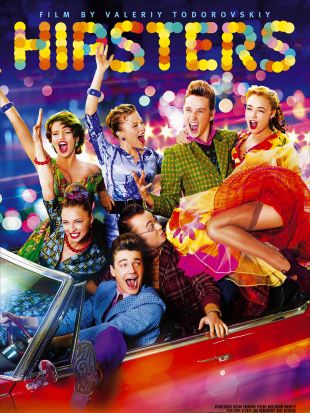
In 1955, the Soviet Union was still locked into a grey, repressive mind-set, in which conformity was the order of the day and deviations from the norm were not merely frowned upon, but considered crimes against the state. Nikita Khrushchev, who had risen to power after Stalin's death two years earlier, had no qualms about intensifying the bitter Cold War against the United States. And any evidence or artifacts of the culture of the outside world were hard to come by. Sounds like a great setting for a lighthearted musical comedy, right? Well, no, not really, but that hasn't stopped director Valery Todorovsky from bringing us the story of a bunch of fun-loving kids whooping it up behind the Iron Curtain in Hipsters (aka Stilyagi), a brightly colored and upbeat movie in which young people turn style into revolt.
Hipsters stars Anton Shagin as Mels, a member of the Young Communist League who's involved in a romance with group leader Katya (Evgeniya Brik) that's moving at a glacial pace. The Young Communists are focused on a new threat to Soviet security -- the Stilyagi, or hipsters, young people who dress in brightly colored, loudly patterned clothing, sport outlandish hairstyles, and dance to bootlegged recordings of American jazz, boogie, and blues. While proper rock & roll hasn't made it into the Soviet Union just yet, the Young Communists see it coming and are determined to stamp it out; they invade hipster gatherings and attack their wild clothes and big hair with scissors. Since laws against subversive activity in the USSR are vague enough to make nearly anything a crime, the threat against the hipsters is very real. However, Mels' heart isn't into the battle against them, and after meeting Polza (Oksana Akinshina), a strikingly beautiful hipster, he throws his lot in with the young bohemians.
Mels buys some black-market threads, transforms his hair into a gravity-defying pompadour, gets tips on dancing from boyhood friend Boris (Igor Voynarovsky), and crashes a hipster party. Mels isn't welcomed with open arms at first, but he's eventually admitted to the fold, and the group's unofficial leader Fedor (Maksim Matveev) becomes his mentor. Fedor, like his fellow hipsters, has adopted an Americanized nickname (in his case, Fred), and just as Polza became Polly and Boris became Bob, Mels shortens his name to Mel. Soon, Fred offers him advice on both style and romance, Mel wins Polly's heart, and the two become lovers. But this doesn't go over well with Katya, who hasn't lost interest in Mel, and while Fred's rebellion comes from a place of privilege -- his parents are well-heeled diplomats who can give him plenty of pocket money and keep him protected -- the others in his circle aren't so lucky, and Mel's budding career as a jazz musician doesn't make his life any easier.
Hipsters was inspired by a real-life youth subculture that attracted much derisive media attention in the Soviet Union during the 1940s and '50s; for the most part, the genuine Stilyagi favored big-band music, and Stalinist Russia may have been the only place on earth where "Chattanooga Choo-Choo" could become an anthem of rebellion. While the details have been changed to fit the USSR in the mid-'50s, Hipsters bears more than a passing resemblance to Julien Temple's Absolute Beginners in its flaming Technicolor depiction of stylish youth and their rebellion against a grey, colorless environment. But while Temple's protagonists were fighting against social norms rather than the state, for all of their anxieties about the KGB none of the characters in Hipsters seem to have any real politics, just a very teenage desire to have fun. Ultimately, Temple made greater points about the politics of youth culture than Todorovsky does here.
Everyone cool or square bursts into song and dance on a regular basis in Hipsters, but the music tends to reflect the way folks remember the 1950s rather than the reality; the original music doesn't sound like jump blues or big-band jazz so much as the swing-revival bands of the late 1990s, and the music, choreography, and costumes are all so over-the-top that the film's efforts to evoke a period ring hollow. (Significantly, all of the songs are original compositions, with no actual period numbers to be heard.) Oksana Akinshina is lovely and beguiling as Polly, and Anton Shagin's wide-eyed naiveté works well for the character (even if his resemblance to a young Conan O'Brien doesn't register in his homeland), but the big, splashy tone of the movie is overdone, and at 125 minutes it starts to wear out its welcome at the three-quarters point. Hipsters takes on a more somber tone for its finale, which ultimately suits it better than the forced mania of the early reels (despite the addition of a highly improbable plot point), but it never quite rings true either as a coming-of-age story or a saga of youth in revolt. If you want to see a film about Soviet-era rock & roll kids, better to seek out Peter Gothar's fine and underappreciated Megall Az Ido (aka Time Stands Still), a picture about young Hungarian misfits that's darker but far more poignant and affecting than this.
